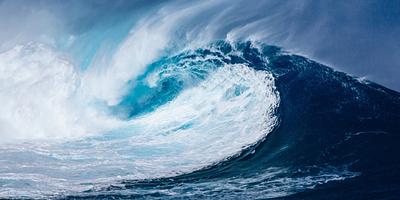Under pressure, but immediate action will make a difference
Professor Colin Moffat a highly-regarded marine science expert, takes a look at the consequences of human behaviour on our oceans worldwide and considers what we might do to reduce those impacts.
The ocean maintains life on Earth. It provides us with oxygen, food, energy and anti-cancer drugs as well as circulating heat and nutrients around the planet. Furthermore, the ocean is teaming with life. From viruses to whales and from shallow waters to the deep hadal zone, the ocean contains peculiarities about which we continue to learn every day. However, the ocean has absorbed just over a quarter of the additional carbon dioxide emitted by human activities and 93% of the additional heat. This has resulted in increased temperatures, increased respiration, trophic mismatch, more acidic waters and sea level rise. Other human activities have brought the additional pressures of pollution, be it nutrients, contaminants, plastics, noise or light, invasive non-native species and the excessive removal of target species as well as the removal of non-target species. The ocean is on a knife edge with irreversible tipping points a genuine risk.
All, however, is not lost. Individual and corporate action will make a difference, but this must happen now. We must challenge the decision makers constructively, continuously and with candour. We must adapt. We must network across all people emphasising and encouraging change such that the combined impacts of the climate and biodiversity crises are significantly mitigated.
Colin is a Trustee of the Scottish Association of Marine Science. He contiues to study contamination of aquatic systems by microplastics and pharmaceuticals, as well as the impacts of ocean acidification and climate change.
Initially studying chemistry, Colin completed a PhD in heparin biochemistry, including links to tumour angiogenesis, before joining Torry Research Station where he investigated the structure of fish lipids and their nutritional benefits. He subsequently studied organic contaminants in the marine and terrestrial environments, pathological samples, food-producing animals and food products with a specific interest in their biological effects on marine biota.
Colin has specialised in the methodology associated with determining the state of marine ecosystems. He lead on the production the OSPAR Intermediate Assessment 2017, an assessments of the North-East Atlantic, and Scotland’s Marine Assessment 2020. Both utilised new indicators and methodologies, providing an assessment of progress towards achieving a clean, healthy and biologically diverse ocean. Colin was also instrumental in laying some of the foundations for the United Nations (UN) Decade of Ocean Science for Sustainable Development (2021 – 2030) and was a member of the Pool of Experts for the UN World Ocean Assessment 2.
Colin continues to study contamination of aquatic systems by microplastics and pharmaceuticals, as well as the impacts of ocean acidification and climate change. Colin is currently a Trustee of the Scottish Association of Marine Science. He is currently involved in a programme of work assessing the impacts of placing wind turbines in the sea. Colin retired from the post of Chief Scientific Advisor Marine to the Scottish Government in 2021.
This event is FREE, but numbers are limited.
Please register to attend and please consider making a donation via our Just Giving page below or selecting a donation ticket to support our vital conservation and education work.
https://www.justgiving.com/scottishseabird-centre
All our education and conservation activities are designed to motivate people to make positive changes in their own lives to protect the marine environment now and in the future. Your support will help ensure we can continue to do that in the years to come. Thank you.
No former knowledge required.
This is a 1 hour online session, with a 45 minute presentation and a Q&A session at the end.
A Zoom link, full joining instructions and information about the event will be shared via email the day before the event.

